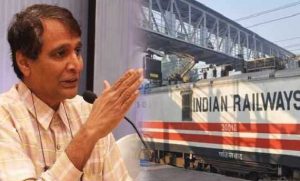The Ministry of Railway has proposed the Finance Ministry to create a non-lapsable safety fund named ‘Rashtriya Rail Sanraksha Kosh’ over five years with initial corpus of Rs. 20000 crore and contribute a portion to fund it in the upcoming Budget 2017 to be presented on February 1.
- Finance Ministry has agreed over the proposal and the fund raised would be utilized for track improvement, bridge rehabilitation work, rolling stock replacement, human resource development, improved inspection system and safety work at level-crossings, among other things.
- The decision to set up the safety fund is based on the recommendation of a high-level safety review committee under the chairmanship of Dr. Anil Kakodkar, former chairman of Atomic Energy Commission.

- The report was submitted by the committee in 2012 and had estimated an investment of Rs. 1 lakh crore on safety fund over five year.
- The decision has also taken into consideration the increasing number of train derailments this year. In the year 2016-17 till January 23, the number of cases recorded was 74 compared to 65 in previous year and is even higher than the number of cases in last 6 years.
Funding of the Rashtriya Rail Sanraksha Kosh
Though the Finance Ministry has approved the proposal of the Railway Ministry to set up the safety fund, but the monetary assistance that would be provided by the Ministry for the upcoming financial year would limit to Rs. 5000 crore.
- Rs. 10000 would be infused from the Central Road Fund (CRF) that is collected by levying a cess on diesel and petrol for safety-related work.
- Besides, the remaining Rs. 5000 crore will have to be raised by the Railway Ministry from its own resources.
Impact of Funding By Railway Resources
The Railway Ministry may introduce a safety tax to fund its Rashtriya Rail Sanraksha Kosh. Either it may levy cess on rail tickets or may raise funds through other non-budgetary resources.
- The impact of increase in rail charges would have a significant effect on the second class and AC-3 tier tickets, while ticket prices of AC 1-tier and 2-tier may increase marginally.
- However in case of freight charges, the ministry is planning to reduce charges on freight as it holds major share of revenue for railway. This will prevent the customers to move to other mode of transportation.
- Earlier in 2001, a similar fund named Special Railway Safety Fund was introduced by the Railway Ministry with an initial corpus of Rs. 17,000 crore. The Finance Ministry granted Rs. 12000 crore and remaining Rs. 5000 crore was raised by Railway Ministry from its financial resources.
- That time the Railways levied a fee of Rs. 1 for second-class ordinary trains and Rs. 2 for second-class Mail or Express trains, per person and for other classes, the surcharge on tickets ranged between Rs. 10 and Rs. 100 depending on the class and distance of journey





